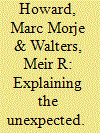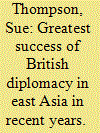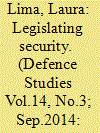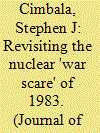| Srl | Item |
| 1 |
ID:
132976


|
|
|
|
|
| Publication |
2014.
|
| Summary/Abstract |
Political scientists have been caught by surprise by some of the world's most dramatic political transformations. To assess how the discipline fared in explaining two of the most large-scale and unexpected developments of the past decades, we compare scholarship around the time of popular mobilization in Eastern Europe in 1989 and the Arab world in 2011. We argue that while scholars cannot be expected to predict utterly extraordinary events such as revolutions and mass mobilization, in these two cases disciplinary trends left scholars ill-prepared to explain them. Political scientists used similar paradigms to study both regions, emphasizing their failure to develop politically and economically along the lines of Western Europe and the United States. Sovietologists tended to study the communist bloc as either anomalously totalitarian or modernizing towards "convergence" with the West. Likewise, political scientists studying the Arab world focused disproportionately on the prospects for democratization or the barriers to it, and they now risk treating the 2011 protest movements essentially as non-events if they are not clearly tied to institutional democratic reform. By broadening their research agendas beyond a focus on regime type, political scientists will be better prepared to understand future changes in the Middle East and elsewhere.
|
|
|
|
|
|
|
|
|
|
|
|
|
|
|
|
| 2 |
ID:
132414


|
|
|
|
|
| Publication |
2014.
|
| Summary/Abstract |
Arthur de la Mare, an under-secretary of state at the British Foreign Office, wrote in 1967 that the ending of the Malaysia-Indonesia Confrontation of 1963-1966 was "the greatest success of British diplomacy in East Asia in recent years." However, historians generally believe British influence in the process to end this conflict was extremely limited, as it has been widely accepted that this conflict ended through bilateral negotiations between Jakarta and Kuala Lumpur. On one level, this view is accurate, but "Confrontation" took months to end and, during this process, British, American, and Malaysian officials hoped to encourage a change in leadership in Jakarta and an eventual end to the conflict. Confrontation was an anti-colonial and a regional dispute greatly affected by the Cold War environment in Southeast Asia and, therefore, not immune from international events or actors, especially the final phase of the conflict
|
|
|
|
|
|
|
|
|
|
|
|
|
|
|
|
| 3 |
ID:
132724


|
|
|
|
|
| Publication |
2014.
|
| Summary/Abstract |
This article examines the traditional conceptions of security and defence in Brazil. It does so by investigating their introduction in the political and legal vocabulary in Brazilian legislation. It further explores these terms as part of a project of militarization of the state and society which peaked during the Estado Novo dictatorship (1937-1945). Legislative sources and political writings of the time are thus used to corroborate the historical analysis and two main arguments: (1) conceptual innovations introduced in legislation allowed the armed forces to establish its monopoly over specific policy areas and, later, (2) to legally exercise control over civilian life. As such, it highlights the early relationship established between Brazilianess and development and argues that speaking security enabled authoritarian sectors to put forward their own project of development.
|
|
|
|
|
|
|
|
|
|
|
|
|
|
|
|
| 4 |
ID:
132457


|
|
|
|
|
| Publication |
2014.
|
| Summary/Abstract |
Between 1979 and 1983, relations between the United States and NATO and the Soviet Union deteriorated gradually due to disagreements and controversies growing out of Cold War rivalry. Some Soviet leaders apparently convinced themselves that there was a nontrivial likelihood of a US or NATO nuclear first use or first strike in the near future, and Soviet intelligence agencies were tasked to anticipate it. A NATO exercise in the autumn of 1983 taking place in this hothouse atmosphere possibly lent itself to misperceptions of American and NATO intentions on account of its realism and some Soviet mind sets. The following discussion revisits the 1983 'war scare' episode by: (1)?reviewing high water marks in the political context leading up to the 1983 'war scare' situation; (2)?considering quantitative evidence on US and Soviet strategic nuclear force structures and possible operational performances; and (3)?deriving from this analysis certain conclusions about the 'war scare' of 1983 and its wider significance.
|
|
|
|
|
|
|
|
|
|
|
|
|
|
|
|